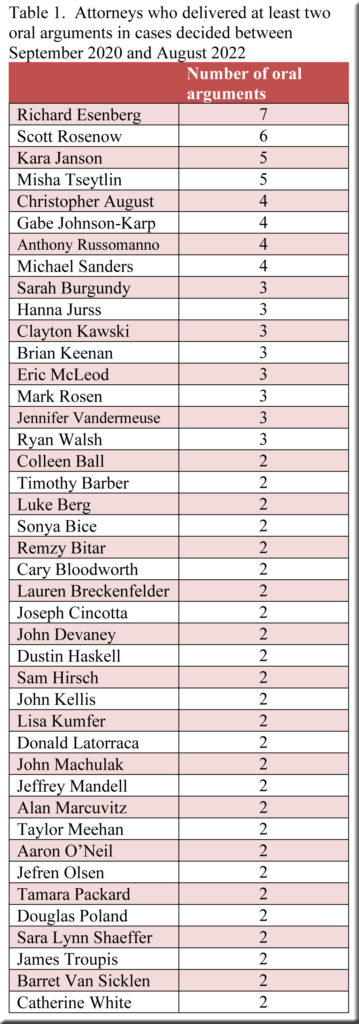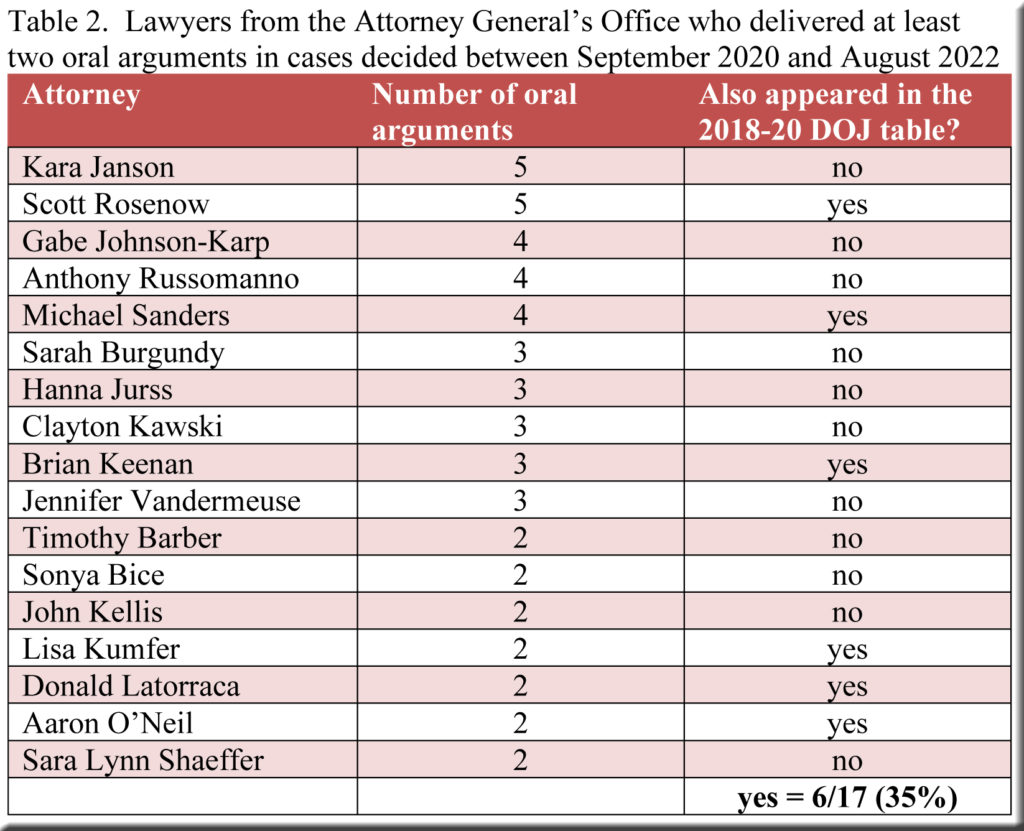Two terms have come and gone since our last post on attorneys who deliver frequent oral arguments at the Wisconsin Supreme Court, so today we’ll revisit the topic and see which lawyers have been most active—not only over the past two years but also the two years before that.
For cases decided during the 2020-21 and 2021-22 terms, one attorney (Richard Esenberg) led the field with seven oral arguments. Just behind came Scott Rosenow (6 arguments), followed by Kara Janson and Misha Tseytlin (5 arguments each). Twelve other lawyers conducted at least three arguments, and if we reduce the cut-off to a minimum of two arguments, we generate the results shown in Table 1—a total of 42 attorneys with two or more appearances before the justices.
Attorney General’s Office
Given that the Attorney General’s Office represents the state in cases before the supreme court, one would expect its lawyers to deliver a substantial share of oral arguments, as indeed they did during the years under consideration. Of the 115 oral arguments recorded in Table 1, the Attorney General’s Office accounted for 51 (44%) of them (Table 2).[1] This corresponds to the Department of Justice’s portion of oral arguments from the previous post covering 2018-19 and 2019-20, and it underscores the prominence of these lawyers at the supreme court.[2]
Although the Attorney General’s share of oral arguments has changed little in recent years, the same cannot be said for the corps of lawyers who conducted them. As noted in Table 2, scarcely more than a third (35%) of the attorneys listed there also figured in an analogous table for 2018-19 and 2019-20.
State Public Defender’s Office
Apart from the Attorney General’s Office, no other agency or law firm sends lawyers to address the justices as frequently as does the State Public Defender, whose attorneys delivered 14 (12%) of the 115 oral arguments included in Table 1. Even more than among the Attorney General’s legions, the “turnover rate” is striking among the most active public defenders in 2018-20 compared to 2020-22. Only one of the six lawyers in Table 3 appeared in the equivalent table for 2018-20.
Private Firms and Non-Profits
When lumped together, private firms and non-profits accounted for a considerable share of the oral arguments in our study—50 (43%) of the 115 arguments in Table 1.[3] The most regular individual participants came from the Wisconsin Institute for Law & Liberty, Troutman Pepper, Husch Blackwell, Rosen & Holzman, and Eimer Stahl, as one can deduce from Table 4, which lists every attorney who conducted no less than two arguments in this category. Approximately one-quarter (26%) of the 19 attorneys in Table 4 also presented at least two oral arguments in cases decided in 2018-19 and 2019-20—a percentage halfway between those for the Attorney General and the Public Defender.[4]
[1] Scott Rosenow also conducted an oral argument while at Eimer Stahl, which is not included in Table 2 (or Table 4). It is counted in Table 1.
[2] The Department of Justice’s share in 2018-19 and 2019-20 was 41%. I use the term Department of Justice for the 2018-20 figures because they include data for the Solicitor General’s Office (which no longer exists) along with data for the Attorney General’s Office.
[3] As noted above, Scott Rosenow conducted five oral arguments for the Attorney General’s Office and one oral argument while at Eimer Stahl. Thus, his name appears in Table 2 (for the Attorney General’s Office), but not in Table 4 because he did not reach the two-argument cut-off for private firms and non-profits. However, I am including his single argument for Eimer Stahl in the total of 50 oral arguments for this category as well as the overall total of 115 arguments for all categories.
[4] Luke Berg, who represents the Wisconsin Institute for Law & Liberty in Table 4, appeared in the 2018-20 Department of Justice table.




Speak Your Mind